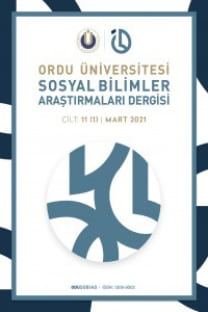Klasik Türk Şiirinde Müddeî
Klasik Türk şiirinde gerek olumlu gerekse olumsuz tipler kendilerine
özgü bir takım ortak karakter özellikleri etrafında birleşir. Olumlu tiplerin
başlıca karakter özellikleri samimiyet, sadakat ve marifet gibi çeşitli
faziletler iken; olumsuz tiplerinki riyakârlık, menfaatçilik ve yalancılık gibi
kötü huylardır. Şairler bu tipleri özellikleri ile birlikte karşılaştırarak
ideal insan tipi ve onunla ilgili telakkileri örnekleme yoluyla
belirginleştirmeye çalışır. Olumlu ideal tipler başta âşık, arif ve rindler olmak üzere gönül ehli
kimselerdir. Bunlar benlikten uzak bir şekilde yaşar. Bu tiplerin kendilerini
başkalarına hoş göstermek ve sahip oldukları üstün vasıfları ispatlamak gibi
bir dertleri bulunmaz. Rakip, zahid, vaiz ve sofu gibi olumsuz tipler ise yaşantısını
benlik üzerine kurmuştur ve bunun gereği olarak şan, şöhret, makam, mal ve mülk
gibi dünya menfaatlerine ulaşmak için tavır, davranış ve sözleriyle çeşitli
faziletlerle donanmış olduğunu iddia ederler. Hayatları genel itibarıyla bu
çerçevede şekillendiğinden dolayı bu tipler müddeî olarak adlandırılır.
Müddeîlik bunların âdeta üst kimliğidir.
Müddeî, ideal insan tipinin sahip olduğu özellikleri taşıdığını ileri
süren fakat bunların hiç birisini taşımayan kimsedir. Onun içi ile dışı, özü
ile sözü bir değildir. Her hareket ve fiili yanıltıcıdır. Sözleri daima
yalandır. İlişkilerini dünya menfaatlerine göre düzenler ve bu yüzden
alçaldıkça alçalır. Kendisiyle bir menfaat çatışması olmadığı hâlde kendine
rakip gördüğü gönül ehli kimselere şiddetle düşmanlık yapar. Onları her
fırsatta kınayarak değersiz göstermeye ve böylece kendini başkalarının gözünde
yükseltmeye çalışır. Kabiliyetsizlik ve cehalet bir yana bırakılırsa bu kötü özelliklerin
başlıca sebebi onun aşk ve muhabbetten uzak olmasıdır. Çünkü bunlardan uzak
olan kimse benlik ve hevanın esiri olduğundan marifet ve hakikate ulaşmanın
şartı olan terk ve fenâ hâllerini yaşayamaz. Müddeînin bu yolda bir gayreti
yoktur. Kendi fikrince bu hâlleri yaşamış ve ulaşılması gereken yere ulaşmış
olduğundan gönül ehlinin bu konulardaki telkinlerine kulak asmaz. Böylece zan
ve hayâllerinin hak ve hakikat olduğu iddiası peşinde sürüklenir ve çeşitli
hilelerle bu davasını ispata çalışır.Bu çalışma, klasik Türk şiirinde müddeîlik kavramını, müddeî olarak adlandırılan
tiplerin ortak karakter ve davranış özelliklerini ve diğer tiplerle
münasebetlerini örnek metinlerden hareketle sergilemeye yöneliktir.
Contender in the Classical Turkish Poem
Positive and negative human types are united
around their specific character features in The Classical Turkish Poetry. Main
character features of positive types are various virtues such as sincerity,
loyalty and ingenuity. On the other hand negative types have bad character
features such as hypocrisy, selfishness and lying. Poets compare these types
with theirs characteristics, try to clarify ideal person and his relevant
conceptions by sampling.Positive ideal types are man of heart,
especially lover, wise and optimistic persons. They live in a way that is away
from selfishness and have no problem of showing themselves like and proving
their superior qualifications to the others. From other side, negative types
such as opponent, ascetic and preacher found their lives upon selfishness and
claim that have been equipped with various virtues in their attitudes,
behaviors and words as a requirement of this reaching the benefits of world
with glory, fame, authority, property and possessions. These types are called
contender (muddeî) because their lives are shaped within this framework in
general. This (muddeî) name is their upper identity almost.Contender is a person that claims that he
has ideal persons’ features, but has none of these. His inner and external
worlds and self and words are not the same. Every move and act misleading. His
words are always lies. He regulates his relations according to world benefits and so descends forever. Although there is not a
conflict interest among them, he treats man of heart as an enemy. He condemn
him in every oppotinity to shows that he is worthless, and so tries to glorify
himself in the eyes of the other peoples.Except for his being talentless and
ignorance main reason for these worst features is to be far from love and
affection. Because a person that is far from these can not live the states of
abandonment and absence that are necessary for ingenuity and truth because of
addition to ego and desires. Contender has not an effort in this direction.
Based on own opinion, the contender thinks that he had lived these status and
reached to all targets whole, ignores the suggestions of the man of heart about
these subjects. Thus, he chases his suspicion and dreams, claims that they are
truth and tries to prove this case with various tricks.This study aims to display concept of
contender and common character and behavior features of contender types and
their relations with other types in Classical Turkish Poem with the sample
texts.
___
- Ahmed Paşa Divanı, hzl.: Ali Nihat Tarlan (1992). Ankara: Akçağ Yay.
- Ahmedî Dîvânı, hzl.: Yaşar Akdoğan, http://ekitap.kulturturizm.gov.tr /TR,78357/ahmedi-divani.html, ET: 15.09.2016.
- Azmî-zâde Hâletî Dîvânı. hzl.: Bayram Ali Kaya, https://groups.yahoo.com/neo/groups/metinbankasi/files. Sep. 2. 2008 versiyonu.
- Beyânî Dîvânı. hzl.: Fatih Başpınar. http://ekitap.kulturturizm.gov.tr/TR,78363/beyani-divani.html. ET: 15.09.2016.
- Bursalı Rahmî Dîvânı. hzl.: Mustafa Erdoğan. http://ekitap.kulturturizm.gov.tr/TR,78364/bursali-rahmi-divani.html. ET: 15.09.2016.
- Cebecioğlu, E. (2005). Tasavvuf Terimleri ve Deyimleri Sözlüğü. İstanbul: Anka Yay.
- Dede Ömer Rûşenî Dîvânı. hzl.: Orhan Kemâl Tavukçu http://ekitap.kulturturizm.gov.tr/TR,78365/dede-omer-ruseni-divani.html. ET: 15.09.2016.
- Edincikli Ravzî Dîvânı. hzl.: Yaşar Aydemir. http://ekitap.kulturturizm.gov.tr/TR,78366/edincikli-ravzi-
- Edirneli Nazmî Dîvânı. hzl.: Sibel Üst. http://ekitap.kulturturizm.gov.tr/TR,78367/edirneli-nazmi-divani.html. ET: 15.09.2016.
